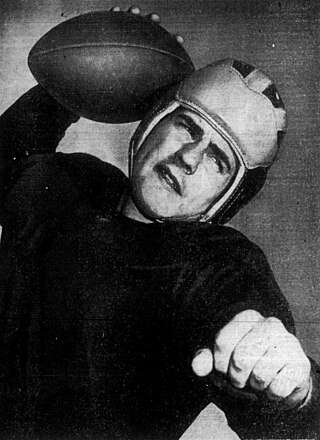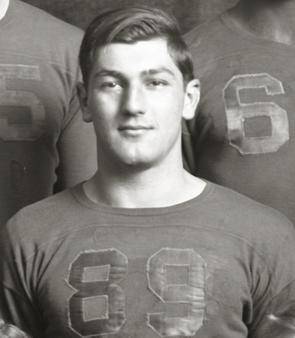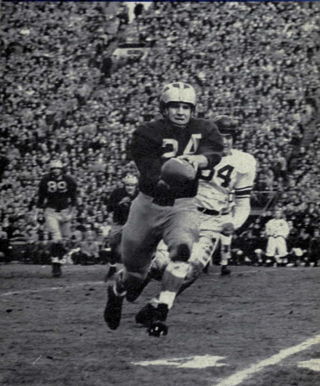
Herbert Orin "Fritz" Crisler was an American college football coach who is best known as "the father of two-platoon football", an innovation in which separate units of players were used for offense and defense. Crisler developed two-platoon football while serving as head coach at the University of Michigan from 1938 to 1947. He also coached at the University of Minnesota (1930–1931) and Princeton University (1932–1937). Before coaching, he played football at the University of Chicago under Amos Alonzo Stagg, who nicknamed him Fritz after violinist Fritz Kreisler.

Robert Richard Chappuis was an American football player who played halfback and quarterback for the University of Michigan Wolverines in 1942, 1946, and 1947. His college years were interrupted by service in the U.S. Army Air Forces during World War II. Chappuis flew 21 missions as a radio operator and aerial gunner on B-25 bombers in the European Theater. His aircraft was shot down in February 1945 in the Lombardy region of Northern Italy. Chappuis parachuted from the plane before it crashed, and Italian partisans rescued him by hiding Chappuis and two other crew members for the final three months of the war.

Anton Henry "Tony" Momsen, Jr. was an American football center in the National Football League (NFL) for the Pittsburgh Steelers and the Washington Redskins. He played college football at the University of Michigan in 1945, 1949 and 1950, and is most remembered for scoring the winning touchdown in the 1950 Snow Bowl game between Michigan and Ohio State.

The 1948 Michigan Wolverines football team represented the University of Michigan during the 1948 Big Nine Conference football season. In its first year under head coach Bennie Oosterbaan, Michigan compiled a 9–0 record, defeated six ranked opponents by a combined score of 122–17, won the Big Nine Conference and repeated as national champions. In the final AP Poll, Michigan received 192 first place votes, twice as many as second-place Notre Dame which garnered 97 first place votes. This remained the last unanimous national title won by the Wolverines until 2023.

The 1947 Michigan Wolverines football team represented the University of Michigan in the 1947 Big Nine Conference football season. In its tenth year under head coach Fritz Crisler, Michigan compiled a perfect 10–0 record, won the Big Ten Conference championship, and defeated the USC Trojans by a score of 49–0 in the 1948 Rose Bowl game. Although ranked second in the AP Poll at the end of the regular season, the Wolverines were selected as the nation's No. 1 team by a 226–119 margin over Notre Dame in an unprecedented AP Poll taken after the bowl games. The 1947 team outscored its opponents, 394–53, and has been selected as the best team in the history of Michigan football.
Eugene Derricotte was an American college football player who was a halfback and return specialist for the Michigan Wolverines from 1944 to 1948. He was one of the first African-American athletes at the University of Michigan in the era when college football was beginning to integrate. Derricotte established school records that still stand as a punt returner for the Wolverines. He also established several short-lived school interceptions records. Derricotte also served as a Tuskegee Airman and later had a successful career in dentistry while continuing to serve in the military.
The 1948 Minnesota Golden Gophers football team represented the University of Minnesota in the 1948 Big Nine Conference football season. In their 14th year under head coach Bernie Bierman, the Golden Gophers compiled a 7–2 record and outscored their opponents by a combined total of 203 to 94.

Richard James Kempthorn was an American collegiate athlete, Air Force pilot, and businessman from Canton, Ohio, US. He played college football on the undefeated national champion 1947 and 1948 Michigan Wolverines football teams and was the Most Valuable Player on the 1949 team. He later served as a jet fighter pilot in the Korean War where he received the Distinguished Flying Cross. He turned down an opportunity to play professional football to join his father in the automobile business. Over the next 50 years, Kempthorn built a series of automobile dealerships in Canton, Ohio.

George Frank Ceithaml was an American football quarterback and coach. He was the starting quarterback for Fritz Crisler's University of Michigan football teams in 1941 and 1942. Crisler later called Ceithaml "the smartest player he ever taught." Ceithaml was selected as the quarterback on the 1942 All-Big Ten Conference team, the captain of the 1942 All-American Blocking Team, and was the 19th player selected in the 1943 NFL Draft. He later served as an assistant football coach at Michigan and the University of Southern California.

Bill Putich was an American football player who played quarterback and halfback for the University of Michigan Wolverines football teams from 1949 to 1951.

Leo Robert "Bugsy" Koceski Jr., also known as the "Canonsburg Comet," was an American football halfback. He played for Michigan's undefeated national championship team in 1948 and the 1950 Big Ten championship team that defeated the California in the 1951 Rose Bowl.

The 1946 Michigan Wolverines football team represented the University of Michigan in the 1946 Big Nine Conference football season. In their ninth year under head coach was Fritz Crisler, the Wolverines compiled a 6–2–1 record, outscored opponents 233 to 73, and finished the season in second place in the Big Nine Conference and ranked No. 6 in the final 1946 AP poll. The team's two losses came against an undefeated Army team that was ranked No. 2 in the final AP poll and against an Illinois team that won the Big Nine championship and was ranked No. 5 in the final AP poll. Michigan won its last four games by a combined score of 162 to 19, starting a 25-game winning streak that continued for nearly three years until October 8, 1949. In the final game of the 1946 season, Michigan defeated Ohio State, 58–6, the Buckeyes' worst defeat since joining the conference in 1913.
The 1945 Michigan Wolverines football team represented the University of Michigan in the 1945 Big Ten Conference football season. In their eighth year under head coach was Fritz Crisler, the Wolverines compiled a 7–3 record and finished the season ranked #6 in the final Associated Press Poll. Quarterback Joe Ponsetto was the team captain, and center Harold Watts won the Most Valuable Player award and was selected as a first-team All-Big Ten Conference player.
The 1938 Michigan Wolverines football team represented the University of Michigan in the 1938 Big Ten Conference football season. After the firing of Harry Kipke in December 1937, Fritz Crisler took over as Michigan's head coach in February 1938. In the first year of the Crisler era, the Wolverines compiled a 6–1–1 record and outscored opponents 131 to 40, allowing an average of only five points per game. The team's only setbacks were a 7-6 loss to Minnesota and a scoreless tie with Northwestern. The Wolverines finished the season ranked No. 16 in the final AP Poll. In the post-season rankings compiled by Frank Dickinson, the University of Illinois professor who developed the Dickinson System, Michigan ranked sixth in the country.

John Edward Weisenburger was an American football and baseball player. He played college football for the University of Michigan from 1944 to 1947 and was the starting fullback for the undefeated 1947 Michigan Wolverines football team that became known as the "Mad Magicians" and has been rated as the greatest football team in Michigan history. He later played professional baseball for five years from 1948 to 1952.

The History of Michigan Wolverines football in the Crisler years covers the history of the University of Michigan Wolverines football program during the period from the hiring of Fritz Crisler as head coach in 1938 through his retirement as head coach after winning the 1948 Rose Bowl. Michigan was a member of the Big Ten Conference during the Crisler years and played its home games at Michigan Stadium.

The History of Michigan Wolverines football in the Oosterbaan years covers the history of the University of Michigan Wolverines football program during the period from the promotion of Bennie Oosterbaan as head coach in 1948 through his firing after the 1958 season. Michigan was a member of the Big Ten Conference during the Oosterbaan years and played its home games at Michigan Stadium.
The 1948 Michigan State Spartans football team represented Michigan State College as an independent the 1948 college football season. In their second season under head coach Clarence Munn, the Spartans compiled a 6–2–2 record and were ranked No. 14 in the final AP Poll. The Spartans were also ranked at No. 3 in the final Litkenhous Difference by Score System ratings for 1948.
The 1948 Big Nine Conference football season was the 53rd season of college football played by the member schools of the Big Nine Conference and was a part of the 1948 college football season.












